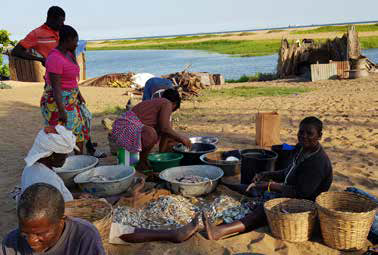
Description of the project: This initiative enhances women’s place in Togo’s fishing sector while conserving endangered mangroves, through the introduction of a new technique mastered by women. Across 230 villages, 1,750 women have been trained to master a new fishing technique using ropes and bait tied to mangrove trees, instead of nets. This practice enables women to stay closer to home and fish during the day, while safeguarding mangroves from being cut. Children’s nutrition has been improved via the inclusion of fish in their diet. Welfare Togo adopts a comprehensive approach to the challenges faced by target communities by engaging in positive education on different health, social and economical topics.
Climate impact: Thanks to this sustainable fishing technique, which does not require the use of motorized boats nor fishing nets, women preserve the fragile ecosystem of the mangroves in Lake Togo. Additionally, they have organized themselves in community mangrove watch groups that engage in reforestation actions and monitor planted areas. Launched in 2015, this initiative will have planted 200,000 mangrove trees by 2025.
Gender impact: Welfare Togo challenges gender inequalities in the male dominated fishing industry through a technical innovation led by women. Approximately 270 female market vendors receive regular income from the new fish catch. Participating single mothers, widows, and street girls are economically and socially empowered, with a goal to reduce unwanted pregnancies and forced marriages, and ultimately encourage engagement in social and political activities.
Scalability / replicability: This project is replicable and scalable in similar environments thanks to a simple and cost effective technology as well as efficient governance. All operations of the project are run at the community level by women and girls themselves, organised in 15 groups that care for a balanced representation of the various ethnics and faiths. Established steering committees can serve as models for additional groups. Over 4,000 members support the initiative with an annual fee of 20 USD, ensuring its sustainability.